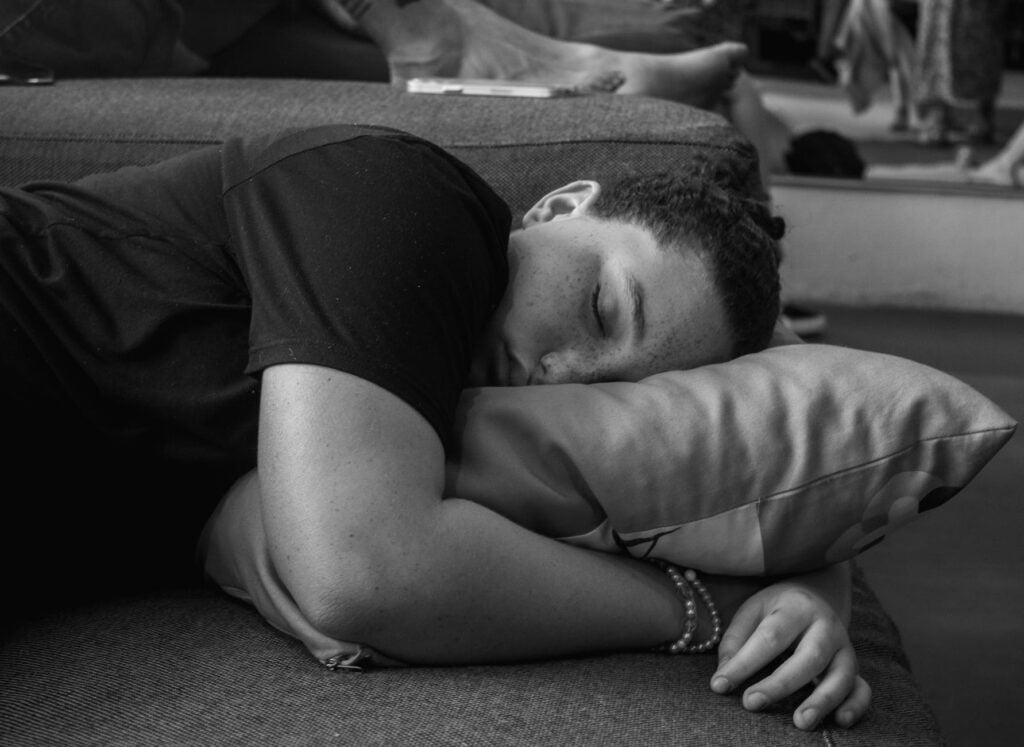Making Awakenings Less Scary: A Key Part of Untangling from Insomnia

Waking up in the middle of the night can feel isolating and frustrating, especially when it feels like the rest of the world is sound asleep. For people with insomnia, the most common reaction is a mix of annoyance, frustration, and a silent plea for sleep to return as quickly as possible.
Understanding Nighttime Wakefulness
First, it’s essential to normalize the experience of waking up at night. Contrary to popular belief, sleeping through the night without waking is more an exception than the rule, especially as we age. Research suggests that our sleep architecture changes over time, with awakenings becoming more frequent but not necessarily indicative of sleep disorders or health issues.
Sometimes, the awakenings are directly related to symptoms from a health condition, such as menopause or chronic pain, which may be out of our immediate control.
If you have been experiencing chronic insomnia and spending excessive amounts of time awake in bed, over time, your bed, nighttime, and sleep can become associated with dread, worry, and wakefulness rather than rest.
The challenge then becomes not the awakening itself but our reaction to it. The stress and anxiety about being awake can be more disruptive than the wakefulness. This is where the concept of “befriending wakefulness” comes into play, a principle aimed at changing our mindset towards nighttime awakenings.
Befriending Wakefulness: A Shift in Perspective
Befriending wakefulness doesn’t mean forcing yourself to stay awake or filling every wakeful moment with activities. Instead, it’s about adopting a non-anxious response to being awake.
It’s recognizing that while you can’t control when you fall asleep, you can shift how you respond to wakefulness.
Here’s how to start:
- Acknowledge and Accept: Recognize that waking up at night is normal. Accepting this can reduce the pressure and anxiety associated with trying to fall back asleep immediately.
- Comfort Over Effort: If you’re awake, consider gentle, comforting activities that feel restful rather than trying hard to induce sleep. This could be anything from taking a few deep breaths, a guided mindfulness exercise, reading a book, or listening to calming music or podcasts. Do whatever you enjoy without worrying about whether it will “make” you sleep. Having things ready can reduce the mental steps needed to get out of bed if sleep isn’t happening.
- Flexible Engagement: Engage in activities that you enjoy but are also conducive to relaxation. The goal isn’t to stay busy but to be at ease. Remember, it’s about creating a calm, comforting environment that invites sleep and rest, not force and frustration.
Practical Tips for Embracing Wakefulness
- Create a Cozy Environment: Ensure your space is conducive to relaxation, whether you’re in bed or in another room. Soft lighting, comfortable seating, and a pleasant temperature can make a significant difference.
- Limit Screen Time: While turning to our phones or TVs is tempting, the blue light emitted by screens can interfere with our ability to fall back asleep. Opt for activities that don’t involve electronic devices, if possible. But if you engage with screens, be mindful of how the content affects you. For example, work emails at 2 am may lead to more worry and planning at a time when it’s not the most helpful.
- Mindfulness and Meditation: Techniques such as mindfulness and meditation can be incredibly effective in managing the stress and anxiety that come with wakefulness. Even a few minutes of deep breathing can help soothe your mind.
- Journaling: If your mind is racing, writing down your thoughts can help clear your mind and make it easier to return to sleep.
Embracing a New Nighttime Narrative

Changing our perspective on nighttime awakenings from a source of frustration to an opportunity for relaxation and self-care can significantly impact our overall sleep quality and how we feel about sleep. It’s about making peace with our bodies’ natural rhythms and finding ways to support ourselves through those wakeful moments.
While these strategies may not eliminate nighttime awakenings, they can make them less daunting and more manageable. By befriending wakefulness, we’re not just improving our chances of falling back asleep more easily but also repairing our relationship with sleep and trust in our bodies.
Shifting the focus from trying to sleep to looking at how we think about sleep is a key part of a comprehensive approach for treating chronic insomnia, such as Cognitive Behavioral Therapy or Acceptance and Commitment Therapy for Insomnia.
Remember, the goal is not to battle wakefulness but to embrace it with kindness and understanding. Each night offers a new opportunity to practice this approach, gradually shifting our nighttime experiences towards something more positive and less scary.
Let’s redefine what it means to wake up at night and discover the peace that comes with meeting ourselves with compassion, no matter the hour.
Trouble sleeping? Schedule your free 20-minute virtual consultation and begin your journey to more good nights and better days.
To learn more about sleep health and science-backed tips to improve your mental health, visit our Blog.
